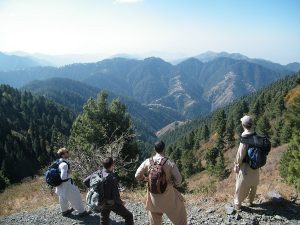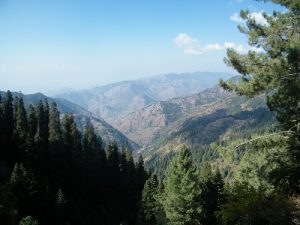 In summer the heat slams down onto Pakistan like a sledgehammer. The sun boils with a malevolent intensity as the temperatures rise, and rise, and rise. Houses become ovens and to go for a walk is to be physically assaulted by a heat which is like a cruel, merciless entity. Street dogs flop over, their sides heaving as they suck in the soup-like air. Birds migrate to the hills. Even flies, rendered idiotic and clumsy by the heat, blunder clumsily from place to place and are easily swatted by those with the energy to do so. And this continues for months, as the burnished skies stretch overhead and people wait in vain for the glimpse of a cloud which might bring cooling rain in its wake.
In summer the heat slams down onto Pakistan like a sledgehammer. The sun boils with a malevolent intensity as the temperatures rise, and rise, and rise. Houses become ovens and to go for a walk is to be physically assaulted by a heat which is like a cruel, merciless entity. Street dogs flop over, their sides heaving as they suck in the soup-like air. Birds migrate to the hills. Even flies, rendered idiotic and clumsy by the heat, blunder clumsily from place to place and are easily swatted by those with the energy to do so. And this continues for months, as the burnished skies stretch overhead and people wait in vain for the glimpse of a cloud which might bring cooling rain in its wake.
At times like these those who are able to do so seek refuge in the northern mountains. Above Islamabad lies the resort towns of Murree, Thandiani and Nathiagali, blessed with snow in the winter and cool weather in the summer. Long lines of Corollas and Pajeros, the caravans of the wealthy, snake into the hills as tourists flee from the heat of the plains, transforming these sleepy backwaters into bustling towns for a few brief months. Crowds of wealthy Punjabi tourists with sunglasses and smartphones photograph each other against the backdrop of the snowcapped Karakorams while the residents of Murree watch, silently, like resident birds observing an invasion of gaudy, squawking parakeets.
If you want to escape both the heat and the crowds you need to do what a group of friends and I did and head further up, deep into the foothills of the Himalaya. Above the town of Nathiagali sits a mountain, Miranjani. At 9,700 ft it is large, easily bigger than any mountain to the south, but dwarfed by the giant peaks that lie to the north. Rakaposhi, Nanga Parbat, Distaghil Sar, the Gasherbrums – their names are as wild and beautiful as the mountains themselves, vast piles of craggy rock, snowcapped year-round, who brood over the southern plains like monoliths. To them, Miranjani is a foothill whose lowly summit is only briefly encased in snow, but although modest, in June and July it is a pine-scented haven, caressed by breezes and speckled with wildflowers.
We parked in Nathiagali and struck out from the trailhead. The ground was rocky underfoot and the path twisted as it climbed. Within a matter of minutes we had left the hubbub of Pakistan entirely behind us. The clatter of rickshaws and the bustle of the bazaar gave way to – to nothing, to the absence of noise, save the twitter of birds and the sighing of the breeze among the pines. From time to time the forest would thin out and we would enter large grassy clearings, pocked by the fireplaces of those who had gone before us, and the patchwork panorama of Pakistan would be spread out beneath us like a quilt. Rolling hills thatched with pine stretched into the beyond. Distant villages were marked only by the trickles of smoke coming from their hearths. We paused, snacked on apples and guavas, and walked on.
A while later we came across a group of Kashmiri men digging in the hillside. At first they were cagey, calling out from behind trees to find out who we were, but eventually came to the path to meet us. They were digging for a kind of root, they said, which was highly valued in Kashmir. They didn’t know exactly what it was used for but it was some kind of medicine for which they could expect to receive a payment of 7,000 rupees (roughly $70) for every kilo they found, so they came to this remote hillside every morning to scratch a living from the earth. Technically it was illegal to dig up this root – hence their reluctance to come and talk to us – but, they said, the police could be bribed into silence. We wished them well and said goodbye, their cheery cries of “Allah hafiz” (God protect you) following us into the forest.
 Reaching the summit of Miranjani required a lung-busting scramble up a rocky ridge to the top. We collapsed, panting heavily in the thin air, before standing up to take in the view. Pakistan stretched all around us, a backdrop of hills and trees. This was the area of northern Pakistan known as the Hazara province, a lush region occupied by countless armies who marched across the subcontinent over the centuries: those of Alexander the Great, of Timur, the early armies of Islam, those of the Moghuls, the Sikhs, and then the British, whose famous exploring officer Major James Abbott pacified the region and founded its largest city, Abbottabad. It is undeniably beautiful, lush and green, and its tumultuous and violent history felt very distant on this peaceful afternoon.
Reaching the summit of Miranjani required a lung-busting scramble up a rocky ridge to the top. We collapsed, panting heavily in the thin air, before standing up to take in the view. Pakistan stretched all around us, a backdrop of hills and trees. This was the area of northern Pakistan known as the Hazara province, a lush region occupied by countless armies who marched across the subcontinent over the centuries: those of Alexander the Great, of Timur, the early armies of Islam, those of the Moghuls, the Sikhs, and then the British, whose famous exploring officer Major James Abbott pacified the region and founded its largest city, Abbottabad. It is undeniably beautiful, lush and green, and its tumultuous and violent history felt very distant on this peaceful afternoon.
The violent history of the Hazara and the peaceful reality of the landscape which stretched out in front of us seemed to me an appropriate metaphor for Pakistan as a whole. In recent years its very name has come to be synonymous with violence and pain as news of terrorist attacks and assassinations, as well as natural disasters such as the 2005 earthquake which tore apart the very land on which we were sitting, are eagerly devoured by the armchair critics of the West. Any article about Pakistan will talk about poverty, corruption, violence, terrorism – in short, the absence of peace.
The words of these journalists are full of sound and fury, and yet they signify nothing. The reality of Pakistan is different, characterised by hospitality, generosity, and a natural beauty of startling grandeur. Gloomy predictions of Pakistan’s demise are found everywhere, ominous prophecies about “failed states” fill up column inches in the West, and yet the people of this country remain kind, generous and resilient, eager to welcome visitors. Armed men have roamed across the Hazara for hundreds of years and yet any men you meet here are more likely to offer you tea and give you their seat.
We turned back the way we had come, trudging back down the trail on weary feet. Later that evening we sat in a local hotel, massaging our blisters and swapping stories over a pot of steaming, sweet Pakistani chai. A waiter in a smart uniform came over to our table.
“Kind sirs, you are our guests. Please, for the chai, there is no charge”.
Outside the call to prayer echoed around the town, its elegant notes hanging in the air like woodsmoke, as the bats swooped and chirruped overhead.







Thanks for posting this Matt – love the Himalayas. Was in the foothills in Northern India on one trip. Closest I’ve been to Pakistan was for the changing of the guard border ceremony at Amritsar. Pakistan is high on my list – esp for some trekking.
Thanks David! The border ceremony is certainly something to behold; I did it myself a few years ago before crossing over into Pakistan the next day. Northern Pakistan has some pretty stunning mountains – do come, if you can get a visa!
I felt like I was walking in that heat! Nice.